

John Locke. John Locke FRS (/ˈlɒk/; 29 August 1632 – 28 October 1704), was an English philosopher and physician regarded as one of the most influential of Enlightenment thinkers and known as the "Father of Classical Liberalism".[1][2][3] Considered one of the first of the British empiricists, following the tradition of Sir Francis Bacon, he is equally important to social contract theory.
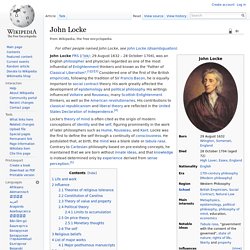
His work greatly affected the development of epistemology and political philosophy. His writings influenced Voltaire and Rousseau, many Scottish Enlightenment thinkers, as well as the American revolutionaries. His contributions to classical republicanism and liberal theory are reflected in the United States Declaration of Independence.[4] Life and work.
Benjamin Franklin. Benjamin Franklin FRS (January 17, 1706 [O.S.
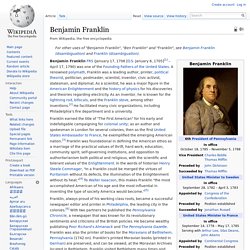
January 6, 1705][1] – April 17, 1790) was one of the Founding Fathers of the United States. A renowned polymath, Franklin was a leading author, printer, political theorist, politician, postmaster, scientist, inventor, civic activist, statesman, and diplomat. As a scientist, he was a major figure in the American Enlightenment and the history of physics for his discoveries and theories regarding electricity. As an inventor, he is known for the lightning rod, bifocals, and the Franklin stove, among other inventions.[2] He facilitated many civic organizations, including Philadelphia's fire department and a university. Franklin, always proud of his working class roots, became a successful newspaper editor and printer in Philadelphia, the leading city in the colonies.[6] With two partners he published the Pennsylvania Chronicle, a newspaper that was known for its revolutionary sentiments and criticisms of the British policies.
Early life in Boston. George Washington. George Washington (February 22, 1732 [O.S.
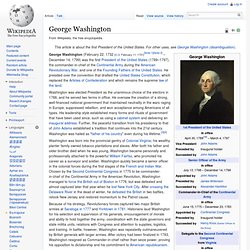
February 11, 1731][Note 1][Note 2] – December 14, 1799) was the first President of the United States (1789–1797), the commander-in-chief of the Continental Army during the American Revolutionary War, and one of the Founding Fathers of the United States. He presided over the convention that drafted the United States Constitution, which replaced the Articles of Confederation and which remains the supreme law of the land. Washington was elected President as the unanimous choice of the electors in 1788, and he served two terms in office. He oversaw the creation of a strong, well-financed national government that maintained neutrality in the wars raging in Europe, suppressed rebellion, and won acceptance among Americans of all types. His leadership style established many forms and rituals of government that have been used since, such as using a cabinet system and delivering an inaugural address. Early life (1732–1753) Washington's birthplace.
American Thinker Blog: Experts say: George Washington's honesty. It is no secret that many of us who reject Obama's neo-communist agenda have turned to the Founding Fathers for guidance; when you think your country's founding principles are under attack, it's natural to re-acquaint yourself with the writings of the extraordinary group of men who wrote our founding documents.
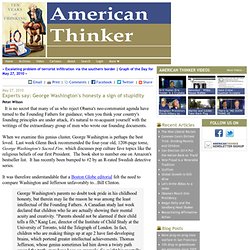
When we examine this genius cluster, George Washington is perhaps the best loved. Last week Glenn Beck recommended the four-year old, 1208-page tome, George Washington's Sacred Fire, which discusses pop culture fave topics like the religious beliefs of our first President. The book shot to number one on Amazon's bestseller list. It has recently been bumped to #2 by an R-rated Swedish detective series.
It was therefore understandable that a Boston Globe editorial felt the need to compare Washington and Jefferson unfavorably to...Bill Clinton. Thomas Jefferson. Thomas Jefferson (April 13 [O.S.
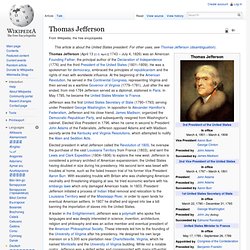
April 2] 1743 – July 4, 1826) was an American Founding Father, the principal author of the Declaration of Independence (1776) and the third President of the United States (1801–1809). He was a spokesman for democracy, embraced the principles of republicanism and the rights of man with worldwide influence. At the beginning of the American Revolution, he served in the Continental Congress, representing Virginia and then served as a wartime Governor of Virginia (1779–1781). Just after the war ended, from mid-1784 Jefferson served as a diplomat, stationed in Paris. In May 1785, he became the United States Minister to France.
Jefferson was the first United States Secretary of State (1790–1793) serving under President George Washington.